Fleurs du Mal Magazine


Or see the index

This little bag
This little bag I hope will prove
To be not vainly made–
For, if you should a needle want
It will afford you aid.
And as we are about to part
T’will serve another end,
For when you look upon the Bag
You’ll recollect your friend
Jane Austen
(1775 – 1817)
This little bag
Poem
•fleursdumal.nl magazine
More in: Archive A-B, Archive A-B, Austen, Jane, Austen, Jane, Jane Austen
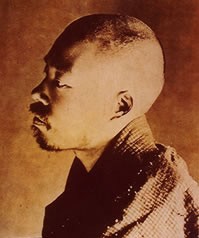
Haiku
After killing
a spider, how lonely I feel
in the cold of night!
Masaoka Shiki
(1867-1902)
Haiku
•fleursdumal.nl magazine
More in: #Editors Choice Archiv, Archive S-T, Archive S-T, Shiki, Masaoka

Soldatenmädchen
Und wenn du Männer zwingen willst,
So mußt du rasch dich rüsten
Und, eh’ im West der Schnee noch schmilzt,
Marschier’n nach Frankreichs Küsten.
Und wenn du Mädchen zwingen willst,
So weck’ nur dein Gelüsten,
Und ruh’ heut’ nacht, daß du es stillst,
An meinen weißen Brüsten.
Und was der Leute Mund drob’ red’t,
Den Spott will ich ertragen;
Wenn dir der Feind nicht widersteht,
Wie sollt’s dein Lieb wohl wagen ?
Ein heißes Herz ist noch kein Fehl,
Ein’ tapfre Seel’ kein Schaden,
Und wenn sich fanden Herz und Seel’,
Wird uns der Himmel gnaden.
Denn so ist dein und mein Geschick:
Dir schuf der Schmied die Waffen;
Den ros’gen Mund, den dunklen Blick,
Die hat mir Gott geschaffen.
Der Schuster hat die Schuh’ gemacht,
Die deinen Weg betraten,
Vom Schneider hab’ ich meine Tracht,
Mein Kindlein vom Soldaten.
Gertrud Kolmar
(1894 – 1943)
Soldatenmädchen
•fleursdumal.nl magazine
More in: *War Poetry Archive, Archive K-L, Archive K-L, Kolmar, Gertrud

Karazah To Karl
Come back to me! my life is young,
My soul is scarcely on her way,
And all the starry songs she’s sung,
Are prelude to a grander lay.
Come back to me!
Let this song-born soul receive thee,
Glowing its fondest truth to prove;
Why so early did’st thou leave me,
Are our heaven-grand life of love?
Come back to me!
My burning lips shall set their seal
On our betrothal bond to-night,
While whispering murmurs will reveal
How souls can love in God’s own light.
Come back to me!
Come back to me! The stars will be
Silent witnesses of our bliss,
And all the past shall seem to thee
But a sweet dream to herald this!
Come back to me!
Adah Isaacs Menken
(1835 – 1868)
Karazah To Karl
•fleursdumal.nl magazine
More in: - Archive Tombeau de la jeunesse, Archive M-N, Archive M-N, Menken, Adah, THEATRE

I’m Nobody!
Who are you?
I’m Nobody! Who are you?
Are you – Nobody – too?
Then there’s a pair of us!
Dont tell! they’d banish us – you know!
How dreary – to be – Somebody!
How public – like a Frog –
To tell your name – the livelong June –
To an admiring Bog!
Emily Dickinson
(1830—1886)
I’m Nobody! Who are you?
• fleursdumal.nl magazine
More in: Archive C-D, Archive C-D, Dickinson, Emily

Der Brief
Ein Fetzen Weh, vom Wind daher gefegt,
Das war er nun.
Ich hab’ ihn still ins heil’ge Buch gelegt,
Zu ruhn – zu ruhn—–
Und die vergilbten Blätter schlössen ihn
So linde ein,
Wie Totenhülle, weißer denn Jasmin,
Der braune Schrein.
So fern der Unrast, die da draußen tost,
Hat er geruht.
Und war der Klage voll und gab mir Trost
Er war so gut—–
Gertrud Kolmar
(1894 – 1943)
Der Brief
•fleursdumal.nl magazine
More in: *War Poetry Archive, Archive K-L, Archive K-L, Kolmar, Gertrud
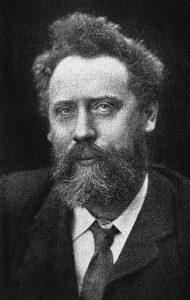
I Am The Reaper
I am the Reaper.
All things with heedful hook
Silent I gather.
Pale roses touched with the spring,
Tall corn in summer,
Fruits rich with autumn,
and frail winter blossoms—
Reaping, still reaping—
All things with heedful hook
Timely I gather.
I am the Sower.
All the unbodied life
Runs through my seed-sheet.
Atom with atom wed,
Each quickening the other,
Fall through my hands,
ever changing, still changeless.
Ceaselessly sowing,
Life, incorruptible life,
Flows from my seed-sheet.
Maker and breaker,
I am the ebb and the flood,
Here and Hereafter,
Sped through the tangle and coil
Of infinite nature,
Viewless and soundless
I fashion all being.
Taker and giver,
I am the womb and the grave,
The Now and the Ever
William Ernest Henley
(1849—1903)
I Am The Reaper
• fleursdumal.nl magazine
More in: Archive G-H, Archive G-H, Henley, William Ernest
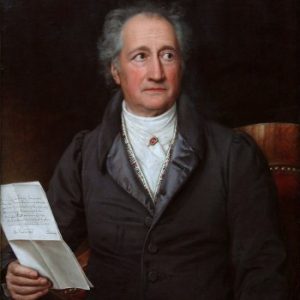
Eins und Alles
Im Grenzenlosen sich zu finden,
Wird gern der Einzelne verschwinden,
Da löst sich aller Überdruß;
Statt heißem Wünschen, wildem Wollen,
Statt läst’gem Fordern, strengem Sollen
Sich aufzugeben ist Genuß.
Weltseele, komm’ uns zu durchdringen!
Dann mit dem Weltgeist selbst zu ringen
Wird unsrer Kräfte Hochberuf.
Teilnehmend führen gute Geister,
Gelinde leitend, höchste Meister,
Zu dem, der alles schafft und schuf.
Und umzuschaffen das Geschaffne,
Damit sich’s nicht zum Starren waffne,
Wirkt ewiges lebend’ges Tun.
Und was nicht war, nun will es werden
Zu reinen Sonnen, farbigen Erden,
In keinem Falle darf es ruhn.
Es soll sich regen, schaffend handeln,
Erst sich gestalten, dann verwandeln;
Nur scheinbar steht’s Momente still.
Das Ewige regt sich fort in allen:
Denn alles muß in Nichts zerfallen,
Wenn es im Sein beharren will.
Johann Wolfgang von Goethe
(1749-1832)
Eins und Alles
•fleursdumal.nl magazine
More in: Archive G-H, Archive G-H, Goethe, Johann Wolfgang von, J.W. von Goethe

My Life had stood
– a Loaded Gun
My Life had stood – a Loaded Gun –
In Corners – till a Day
The Owner passed – identified –
And carried Me away –
And now We roam in Sovreign Woods –
And now We hunt the Doe –
And every time I speak for Him
The Mountains straight reply –
And do I smile, such cordial light
Opon the Valley glow –
It is as a Vesuvian face
Had let it’s pleasure through –
And when at Night – Our good Day done –
I guard My Master’s Head –
’Tis better than the Eider Duck’s
Deep Pillow – to have shared –
To foe of His – I’m deadly foe –
None stir the second time –
On whom I lay a Yellow Eye –
Or an emphatic Thumb –
Though I than He – may longer live
He longer must – than I –
For I have but the power to kill,
Without – the power to die –
Emily Dickinson
(1830—1886)
My Life had stood – a Loaded Gun
• fleursdumal.nl magazine
More in: Archive C-D, Archive C-D, Dickinson, Emily
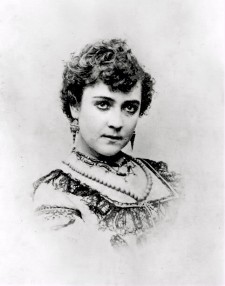
Answer Me
I
In from the night.
The storm is lifting his black arms up to the sky.
Friend of my heart, who so gently marks out the lifetrack for me, draw near to-night;
Forget the wailing of the low-voiced wind:
Shut out the moanings of the freezing, and the starving, and the dying, and bend your head low to me:
Clasp my cold, cold hands in yours;
Think of me tenderly and lovingly:
Look down into my eyes the while I question you, and if you love me, answer me—
Oh, answer me!
II
Is there not a gleam of Peace on all this tiresome earth?
Does not one oasis cheer all this desert-world?
When will all this toil and pain bring me the blessing?
Must I ever plead for help to do the work before me set?
Must I ever stumble and faint by the dark wayside?
Oh the dark, lonely wayside, with its dim-sheeted ghosts peering up through their shallow graves!
Must I ever tremble and pale at the great Beyond?
Must I find Rest only in your bosom, as now I do?
Answer me—
Oh, answer me!
III
Speak to me tenderly.
Think of me lovingly.
Let your soft hands smooth back my hair.
Take my cold, tear-stained face up to yours.
Let my lonely life creep into your warm bosom, knowing no other rest but this.
Let me question you, while sweet Faith and Trust are folding their white robes around me.
Thus am I purified, even to your love, that came like John the Baptist in the Wilderness of Sin.
You read the starry heavens, and lead me forth.
But tell me if, in this world’s Judea, there comes never quiet when once the heart awakes?
Why must it ever hush Love back?
Must it only labor, strive, and ache?
Has it no reward but this?
Has it no inheritance but to bear—and break?
Answer me—
Oh, answer me!
IV
The Storm struggles with the Darkness.
Folded away in your arms, how little do I heed their battle!
The trees clash in vain their naked swords against the door.
I go not forth while the low murmur of your voice is drifting all else back to silence.
The darkness presses his black forehead close to the window pane, and beckons me without.
Love holds a lamp in this little room that hath power to blot back Fear.
But will the lamp ever starve for oil?
Will its blood-red flame ever grow faint and blue?
Will it uprear itself to a slender line of light?
Will it grow pallid and motionless?
Will it sink rayless to everlasting death?
Answer me—
Oh, answer me!
V
Look at these tear-drops.
See how they quiver and die on your open hands.
Fold these white garments close to my breast, while I question you.
Would you have me think that from the warm shelter of your heart I must go to the grave?
And when I am lying in my silent shroud, will you love me?
When I am buried down in the cold, wet earth, will you grieve that you did not save me?
Will your tears reach my pale face through all the withered leaves that will heap themselves upon my grave?
Will you repent that you loosened your arms to let me fall so deep, and so far out of sight?
Will you come and tell me so, when the coffin has shut out the storm?
Answer me—
Oh, answer me!
Adah Isaacs Menken
(1835 – 1868)
Answer Me
•fleursdumal.nl magazine
More in: - Archive Tombeau de la jeunesse, Archive M-N, Archive M-N, Menken, Adah, THEATRE
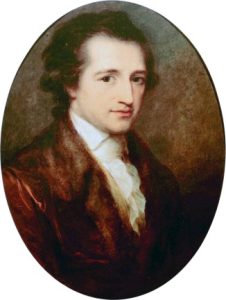
Philine
Singet nicht in Trauertönen
Von der Einsamkeit der Nacht!
Nein, sie ist, o holde Schönen,
Zur Geselligkeit gemacht.
Wie das Weib dem Mann gegeben
Als die schönste Hälfte war,
Ist die Nacht das halbe Leben,
Und die schönste Hälfte zwar.
Könnt ihr euch des Tages freuen,
Der nur Freuden unterbricht?
Er ist gut, sich zu zerstreuen;
Zu was anderm taugt er nicht.
Aber wenn in nächt′ger Stunde
Süßer Lampe Dämmrung fließt,
Und vom Mund zum nahen Munde
Scherz und Liebe sich ergießt;
Wenn der rasche lose Knabe,
Der sonst wild und feurig eilt,
Oft bei einer kleinen Gabe
Unter leichten Spielen weilt;
Wenn die Nachtigall Verliebten
Liebevoll ein Liedchen singt,
Das Gefangnen und Betrübten
Nur wie Ach und Wehe klingt:
Mit wie leichtem Herzensregen
Horchet ihr der Glocke nicht,
Die mit zwölf bedächt′gen Schlägen
Ruh′ und Sicherheit verspricht!
Darum an dem langen Tage
Merke dir es, liebe Brust:
Jeder Tag hat seine Plage,
Und die Nacht hat ihre Lust.
Johann Wolfgang von Goethe
(1749-1832)
Philine
•fleursdumal.nl magazine
More in: Archive G-H, Archive G-H, Goethe, Johann Wolfgang von, J.W. von Goethe
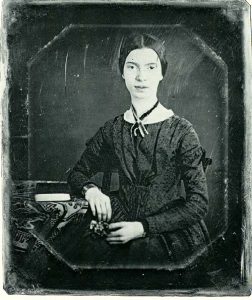
Because I could not stop
for Death
Because I could not stop for Death –
He kindly stopped for me –
The Carriage held but just Ourselves –
And Immortality.
We slowly drove – He knew no haste
And I had put away
My labor and my leisure too,
For His Civility –
We passed the School, where Children strove
At Recess – in the Ring –
We passed the Fields of Gazing Grain –
We passed the Setting Sun –
Or rather – He passed Us –
The Dews drew quivering and Chill –
For only Gossamer, my Gown –
My Tippet – only Tulle –
We paused before a House that seemed
A Swelling of the Ground –
The Roof was scarcely visible –
The Cornice – in the Ground –
Since then – ’tis Centuries – and yet
Feels shorter than the Day
I first surmised the Horses’ Heads
Were toward Eternity –
Emily Dickinson
(1830—1886)
Because I could not stop for Death
• fleursdumal.nl magazine
More in: Archive C-D, Archive C-D, Dickinson, Emily
Thank you for reading Fleurs du Mal - magazine for art & literature